Making His Mark Among the Living
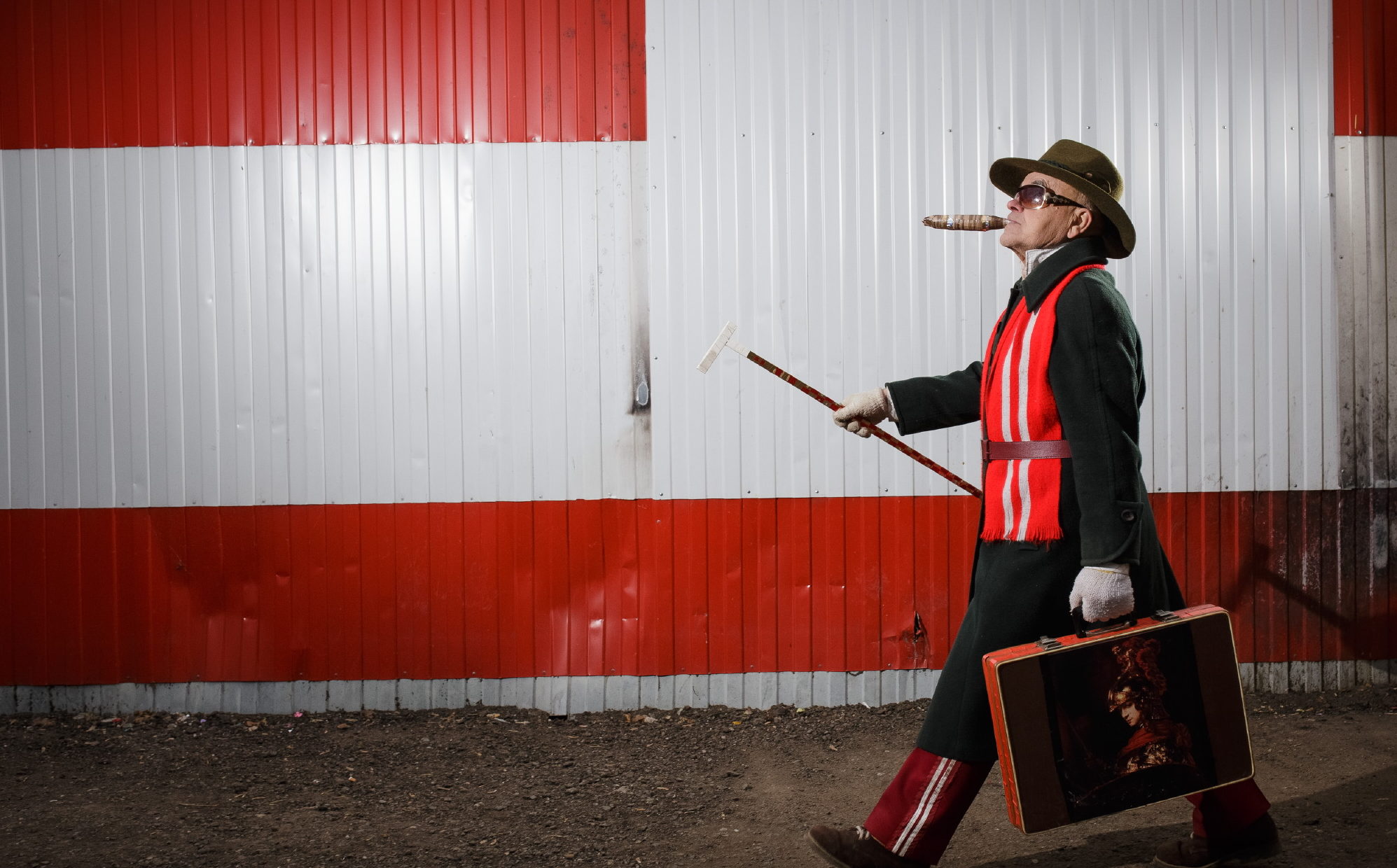
Victor played the accordion in the House of Culture. He loved the stage and smart clothing. And so, when he was sent into early retirement because of a disability, he decided to make the world his perennial stage.
When Victor was seven, his mother sewed him a white shirt and black pants. Then, somewhere, she found a pair of calf-skin boots – very rare at the time. And then she sent her son to the store in this outfit, for bread and sugar.
On the steps of the store Victor was met by two fourth-graders – Vaska and Kolka. The boys were leaning against the door, blocking the entrance, and they scanned Victor from head to toe. Then Vaska hauled off and socked Victor in the nose.
“I fell down and they left, continuing with whatever they were doing, giving the impression that they had accomplished something extremely important,” Victor recalls. “From that day forward I decided that I would always be smartly dressed. After all, if they saw that I stopped dressing stylishly after what happened, they might think they had frightened me.”
The Accordionist’s Wardrobe
Victor Kazakovets is 72 and lives in Veresniki, a dismal, remote section of Kirov. The locals know him for his snappy attire and call him “the Vyatka Dandy.” (The city and province of Kirov – named for the communist leader Sergei Kirov, assassinated in 1934 – were known in the pre-Bolshevik era as Vyatka and Vyatskaya Gubernia, respectively.)
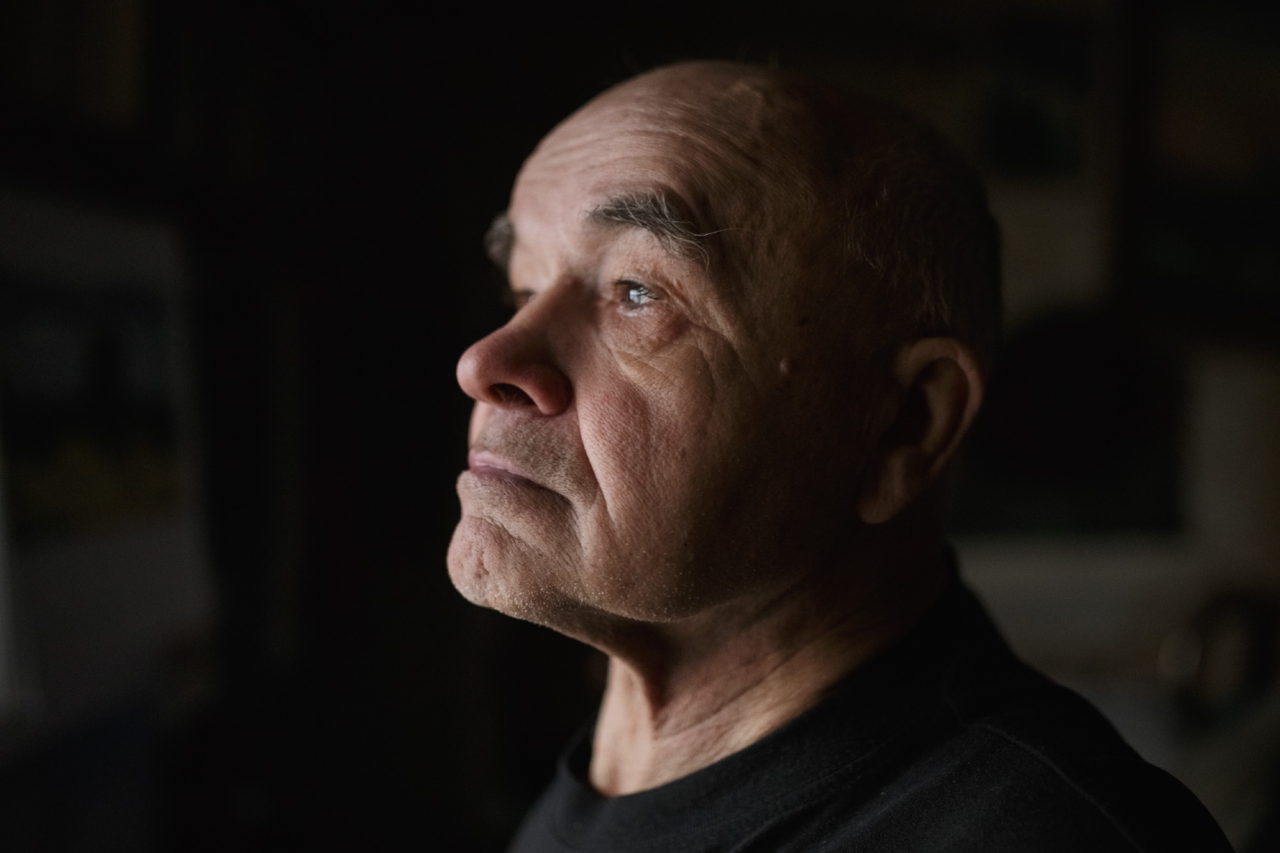
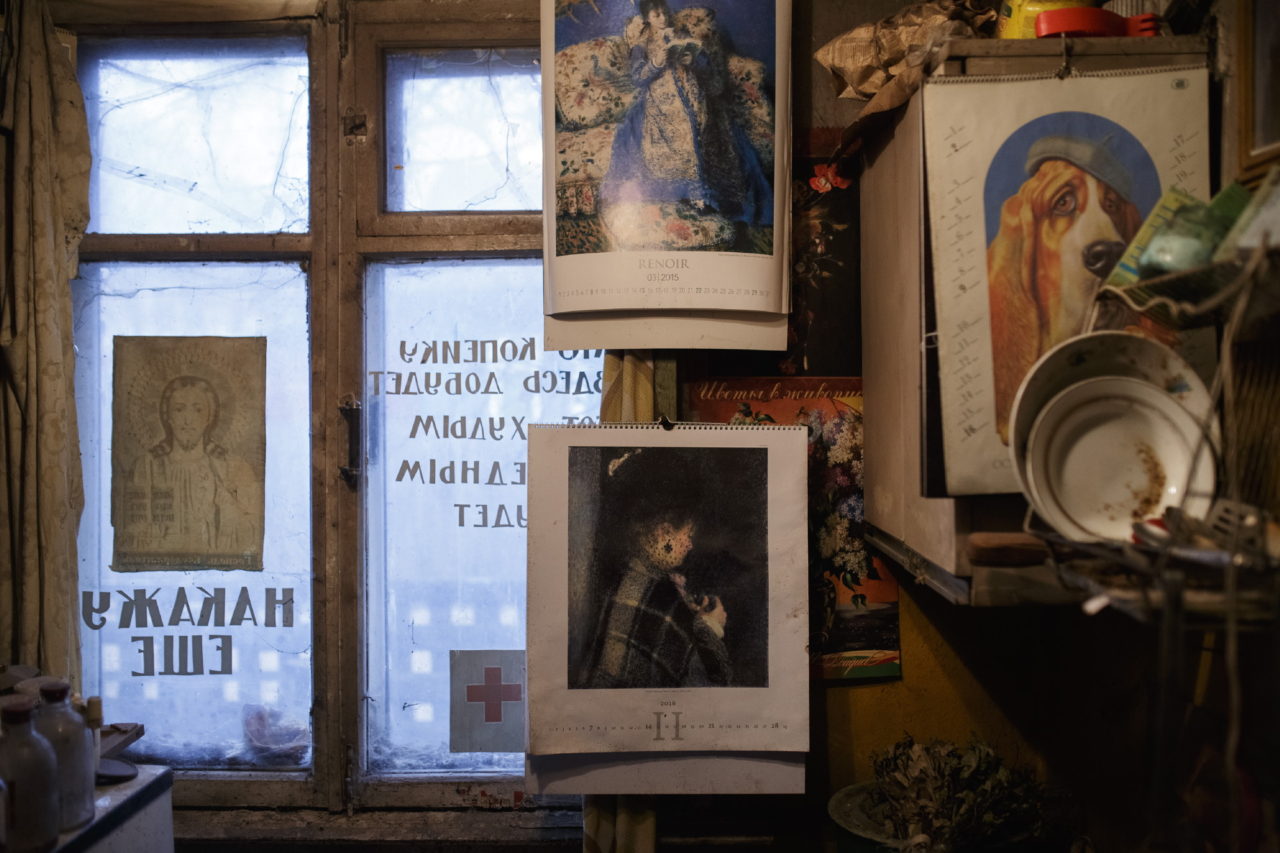
In order to find Victor’s home, I walk the entire length of Klyuchevaya Street and several lanes. Everywhere there is mud, and half-collapsed or burnt-out homes. Several babushkas whom I stop to ask where Victor Kazakovets lives reply by asking, perplexed, “Oh, he’s our weirdo… What do you need him for?” But still they show me the way.
It is a small, wooden home, with a front door so small it seems as if Bilbo Baggins might live here. In one of windows hangs a portrait of Stalin. I start to feel a bit uncomfortable.
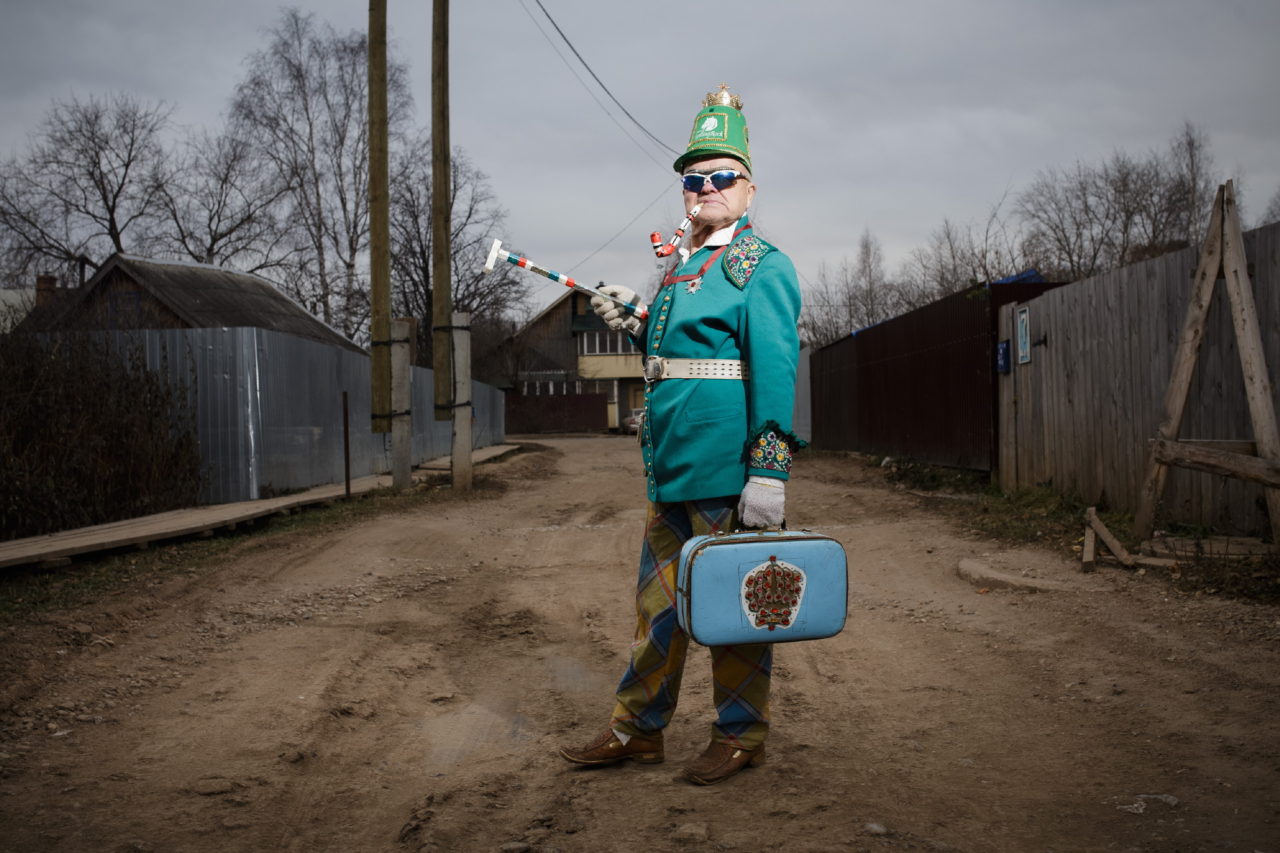
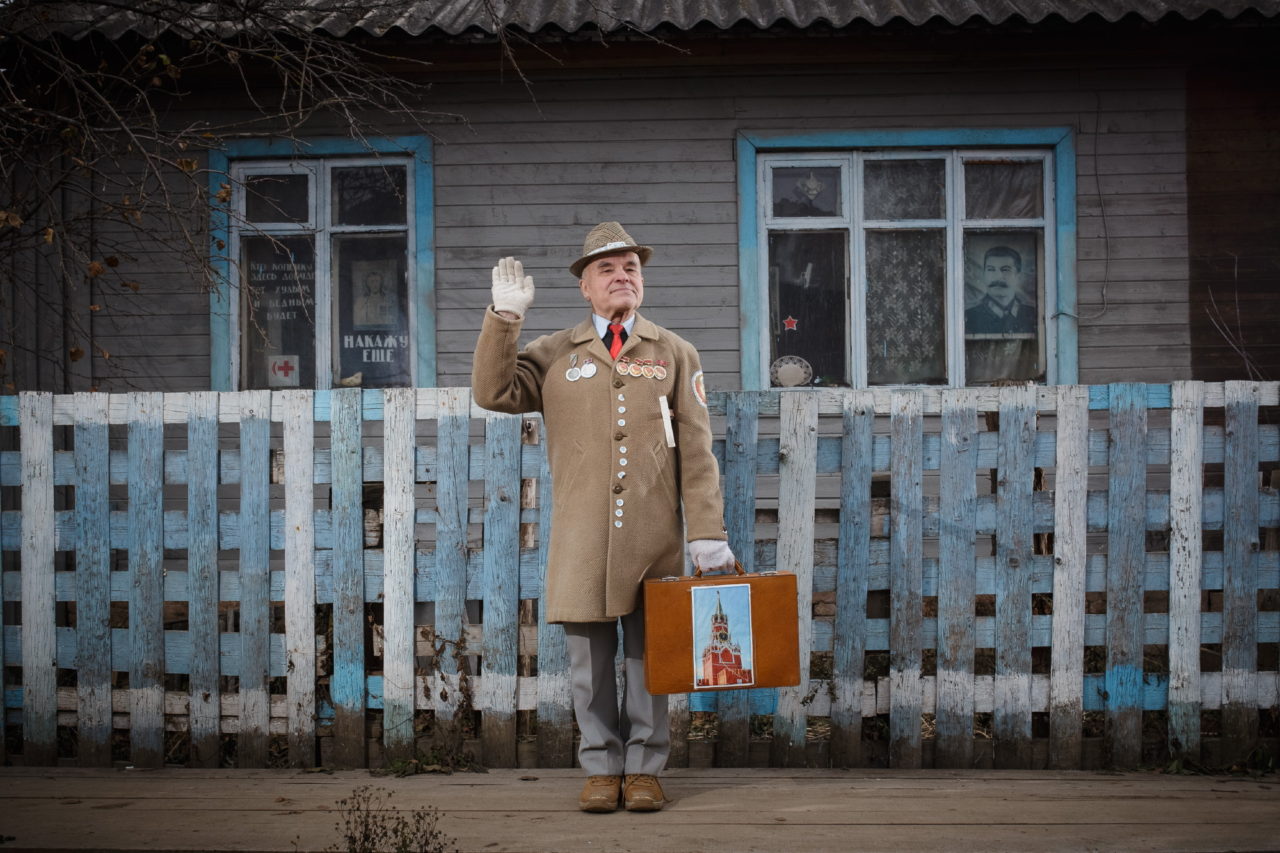
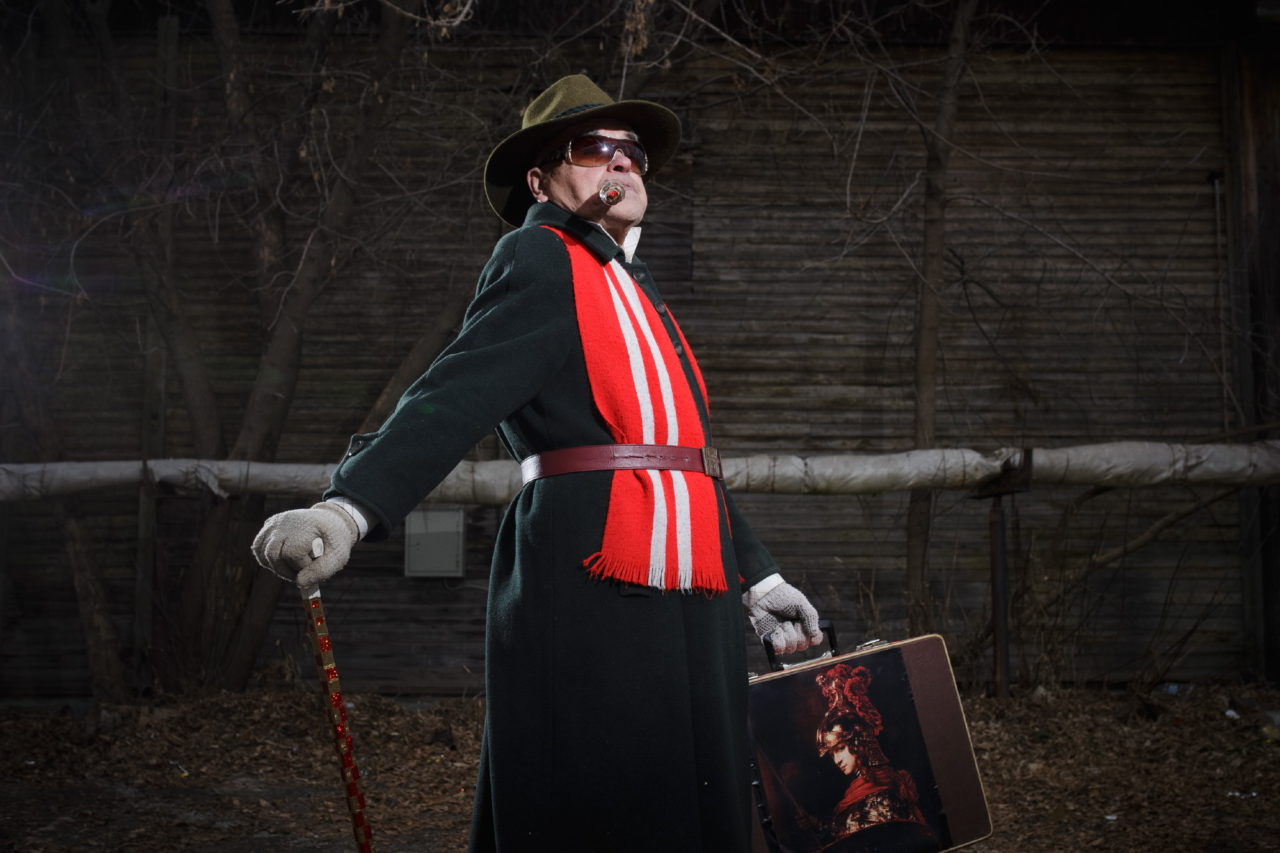
Kazakovets unbolts the door and appears in a white skullcap and white pants with red stripes. His face is kind, his expression befuddled. At the threshold he warns me about the mess inside, with clothes everywhere. He is not lying: clothes fill two closets, a pantry, all the shelves, chairs, nails on the door, and even the bed. Aside from this, the walls of the room are covered with calendars featuring paintings of famous artists, as well as with paintings he created himself. Opposite the entrance is an ancient gramophone. A table stands near the window, and alongside that a television. There are lots of books. A wood stove provides the heat. Water comes from the nearest pump or outside.
Victor and his wife divorced long ago, and he has two grown sons. One lives in Siberia, the other here, in Kirov, but they do not keep in touch. Victor avoids answering why, saying that they simply have different world views. Kazakovets also has no friends – all of them have already passed on. By his reckoning, one should expect to live like a hermit at 70.
Yet it would be hard to call him a hermit.
Every morning, Victor puts on one of his extravagant outfits (he sews and alters them all himself) and heads out to march around the central streets of Kirov. He smiles at pedestrians who catch his gaze, even saluting if his outfit allows it. Some call him crazy, but he only acknowledges positive feedback.
Victor’s mother raised him alone. She worked long hours and always tried to dress her son in the finest clothes. Little Victor’s outfits were far more stylish than those worn by the children of higher-ups. But even then, in school, Victor understood that it was not desirable to stand out in society for any reason: not through one’s clothing (witness the bashed nose for the calfskin boots), and not because of one’s talent.
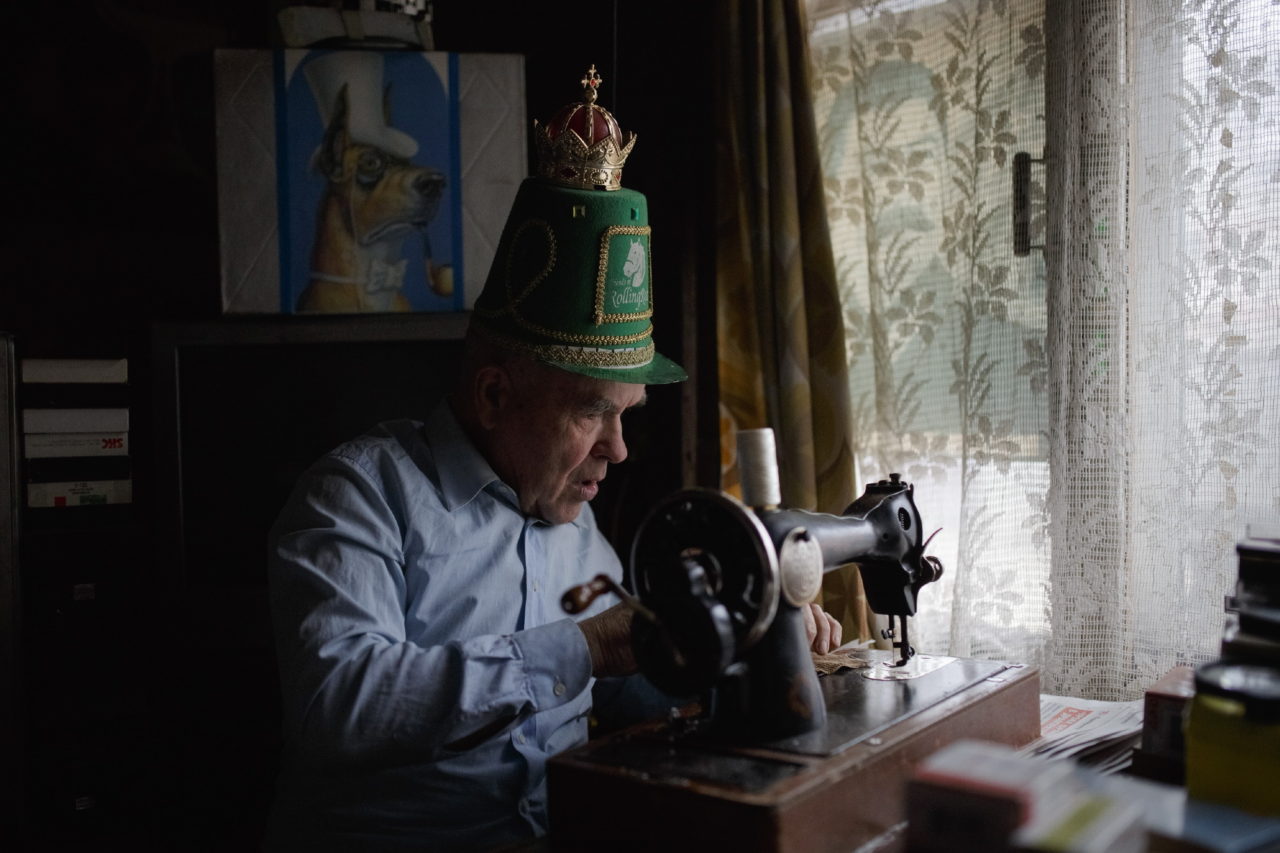
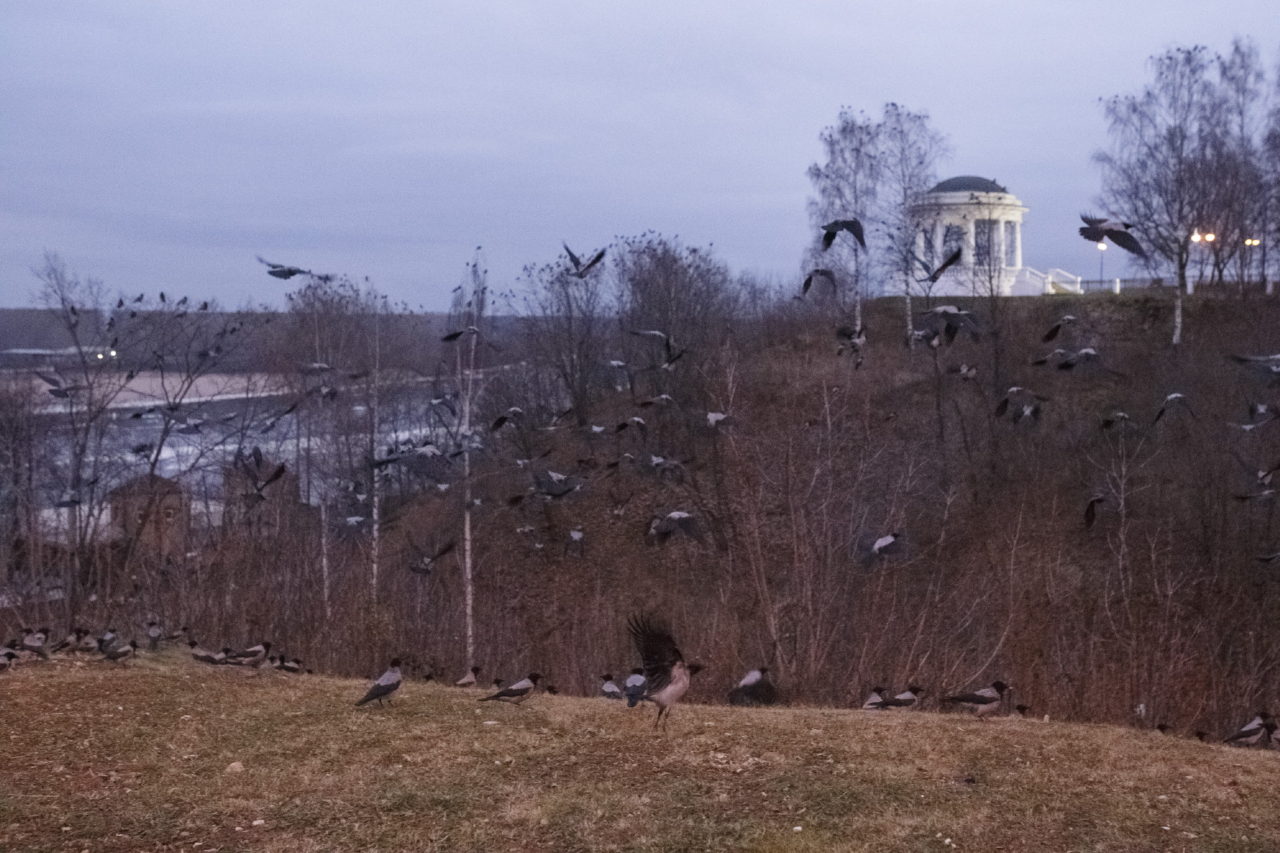
In Victor’s second grade class, students were given the task of memorizing a song. Each kid stood up and sang. Victor had an excellent ear and voice, and so he sang better than anyone, for which he received a perfect grade of five. But in the evening, when he returned home, he could not for some reason find his kitten anywhere.
“I called it, ksk ksk – but there was just silence. Couldn’t find it anywhere. In the morning, I arrived at school and looked out the window. Outside the window was the playground’s pull-up bar. And my kitten was hanging from that bar. On that day I realized that you have to fight to have a peaceful life in society. That class hatred exists (later I was told that my classmates were stung by my fine singing, that they wanted revenge). From that day forward I never got another pet, fearing that my class enemies might take revenge on it. I just had chickens, that’s all. And that’s why I hung Stalin in the window, to scare off the hooligans.
Beaten For a Hat
After school, Victor was employed as a cultural-educational worker, playing the accordion. It wasn’t because he sought the good life. At 14 Victor had begun to have epileptic seizures, which radically reduced the range of professions open to him. And he had been playing the accordion since he was a boy.
After graduating from a special music high school, Victor worked in the nearby village of Tuzha, in the regional House of Culture, as the performance director. He accompanied a choir and dance ensemble. Kazakovets not only performed, however, but also helped to choose and create the ensemble’s outfits.
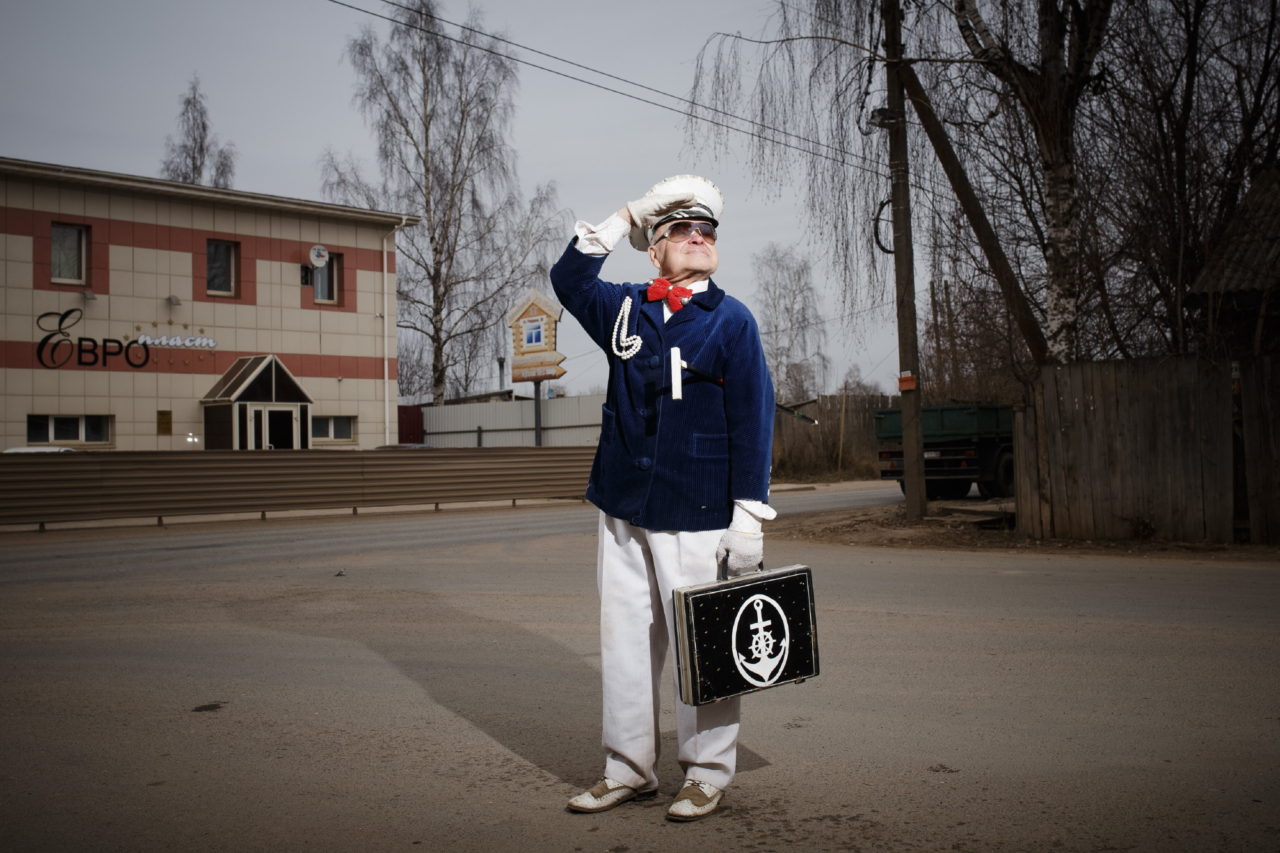
“I tried to design them so that they were bright and striking, so that they were easily visible from the back of the hall. So that even the drunkards would sober up and watch the stage. When people look at you, when they applaud, it’s really nice. On the other hand, hecklers always show up right away.”
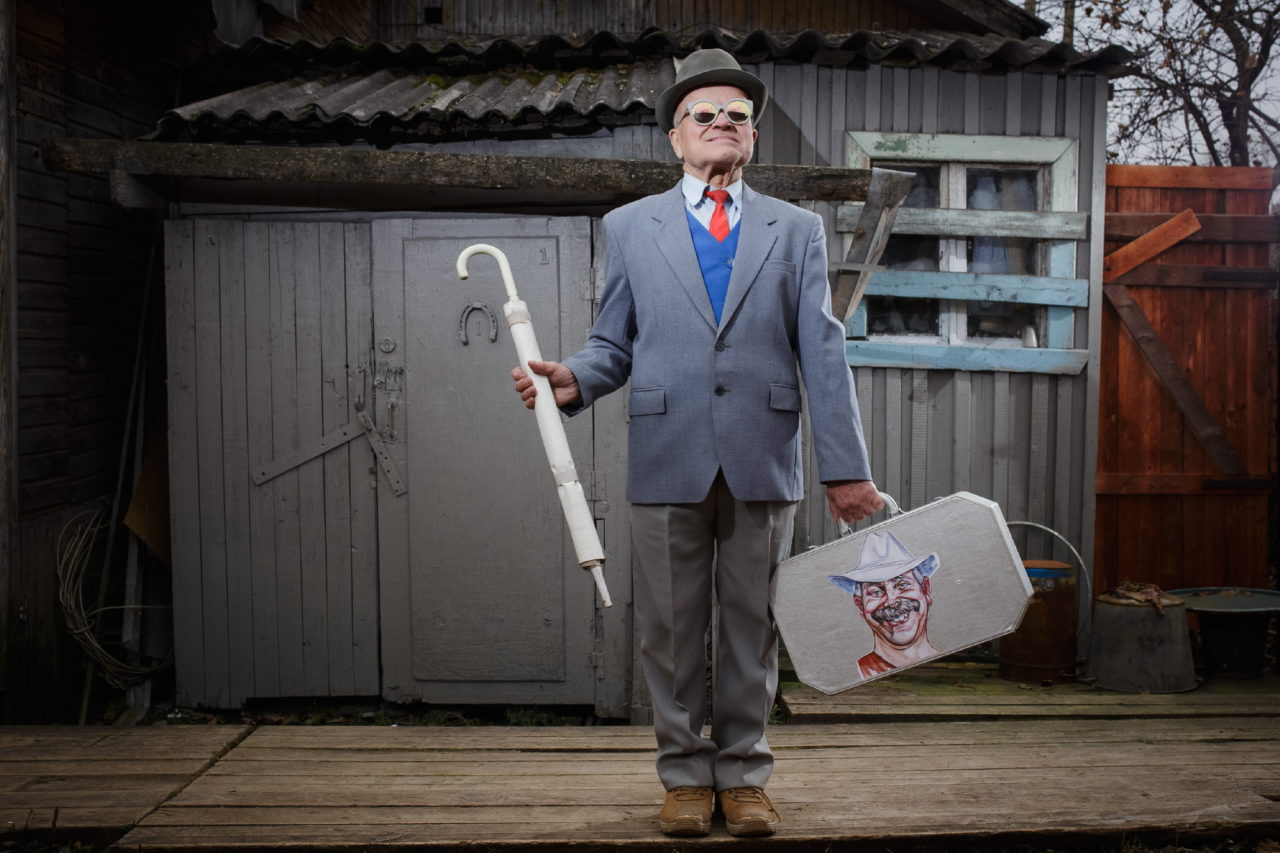
Victor explains that, in the Soviet era, cultural-educational workers were watched over by Communist Party organizations. You had to present yourself as cultured and tidy. You could only shine on stage. Therefore, outside of work he only allowed himself to wear a hat and white shirts. And yet, once, when he was riding his bike past a timber works, several guys jumped out of the bushes and beat him nearly to death. They beat him in the kidneys, all over his body, but mostly on his legs and face. To this day, Kazakovets does not understand how he survived the attack. But he says he knows why they beat him: because of his hat.
The doctors did not detect any internal injuries (x-rays were rare back then), so they salved him and bound him up, let him rest a bit, and then sent him home.
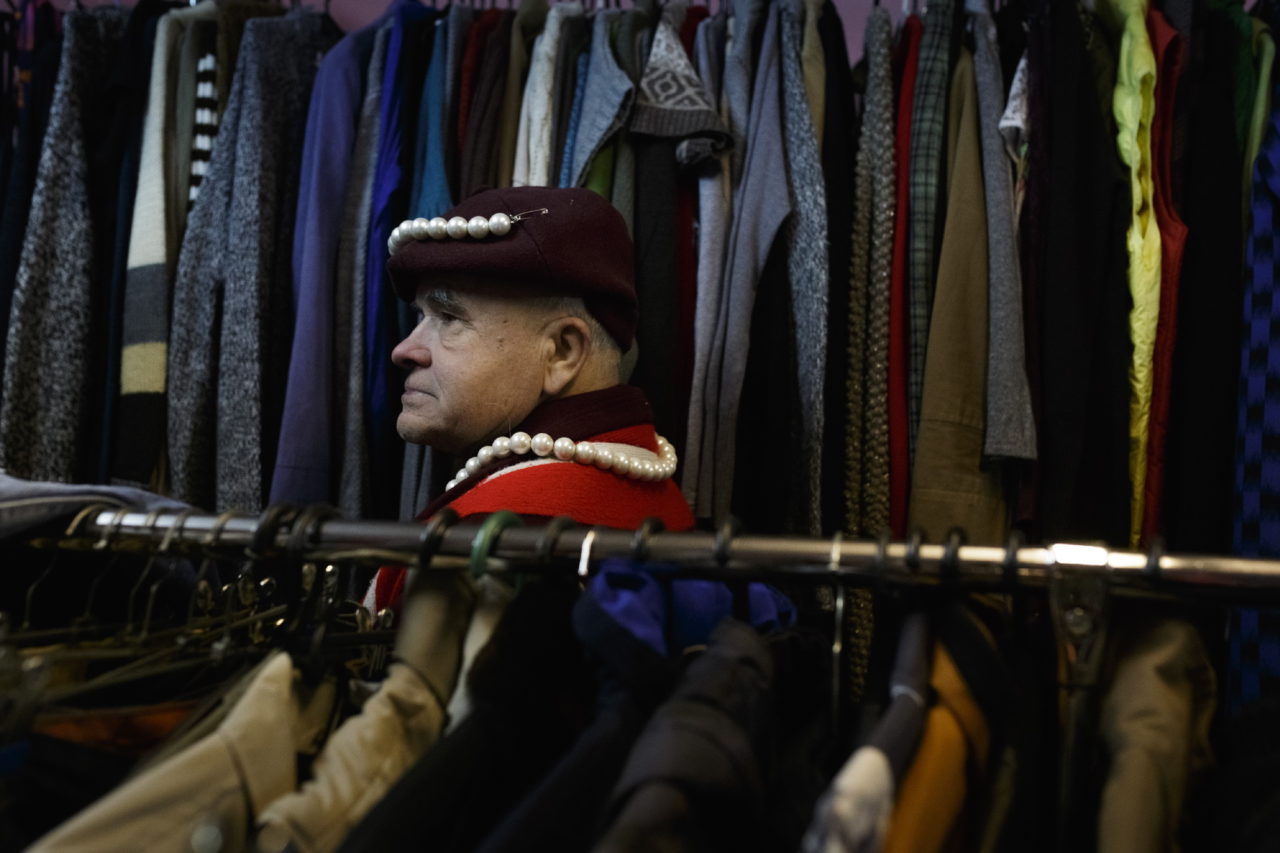
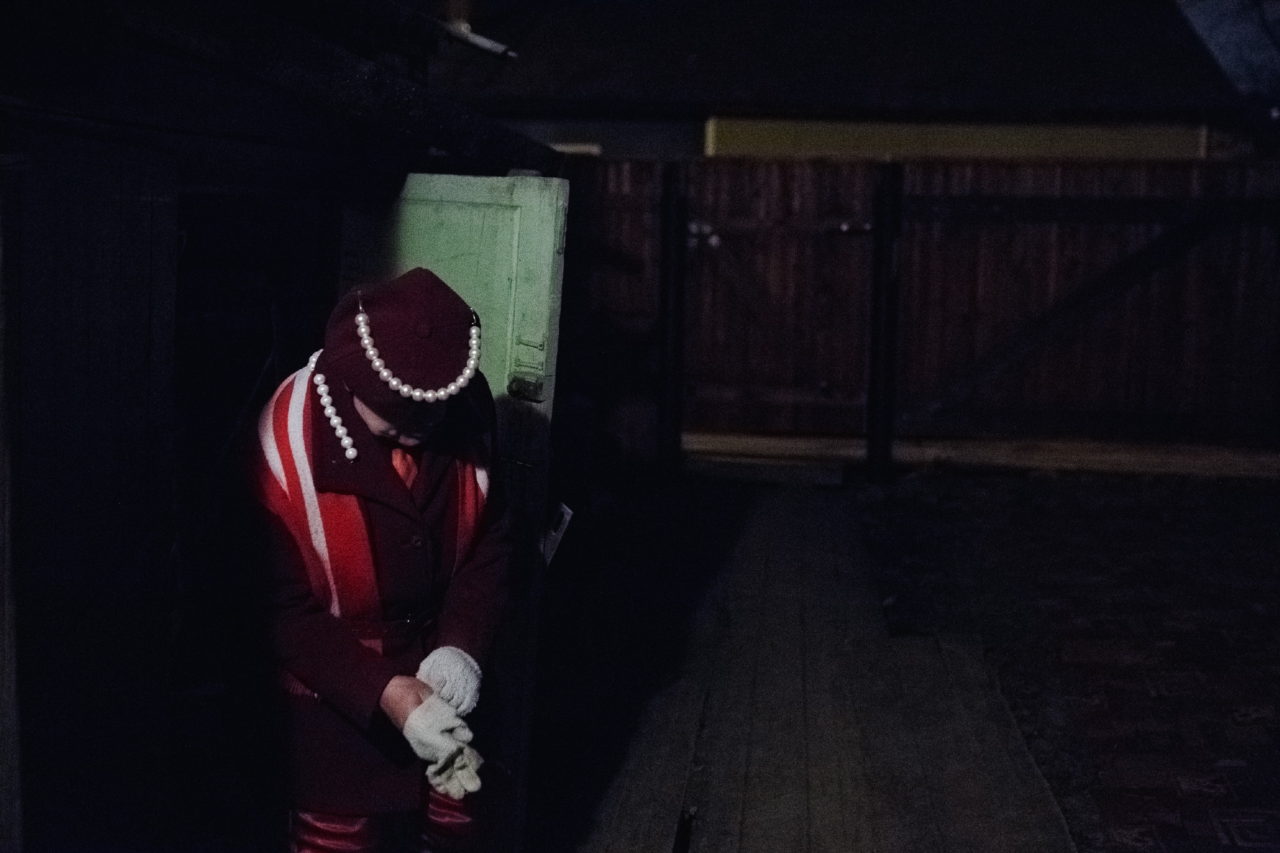
Later, Kazakovets worked as deputy club director at the timber works, organizing amateur theatrics. That’s when he received this little shack of an apartment. He eventually became director of the Kirov Palace of Culture, and then, in 1982, was let go. “I was a patient at the psycho-neurological clinic. And so the doctors conferred with the bosses, and they sent me into early retirement due to disability. I did not object. If they don’t need me, why should I dig in my heels?”
For a time, the 36-year-old retiree continued working at the timber works, sawing logs into boards along the river. “I liked it: rolling logs to the mill, constantly in motion, the smell of sawdust. You feel alive.”
To Emerge from the Gloom
Then, as Kazakovets put it, “democracy happened.”
“When, in 1993, they pronounced the words ‘freedom’ and ‘democracy,’ I understood that there was a chance to emerge from the gloom,” he said. “I remembered how they wouldn’t let us wear bright clothing, and I said to myself, ‘That’s it, I will now dress so that even the horses will turn and look at me.’ And that’s what happened.”
In the morning, Victor is waiting for me in a white suite with red ribbons, with a homemade sword and a white cap with a red star.
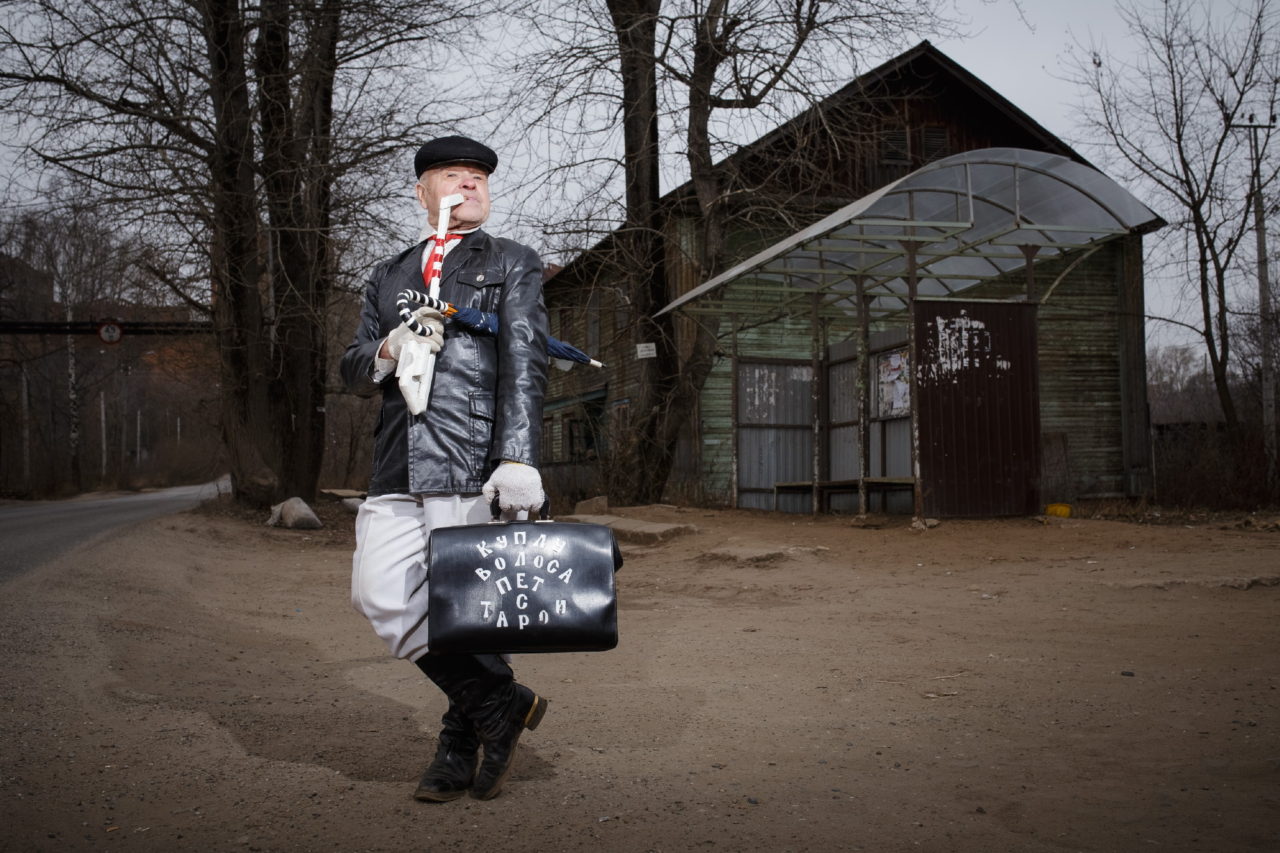
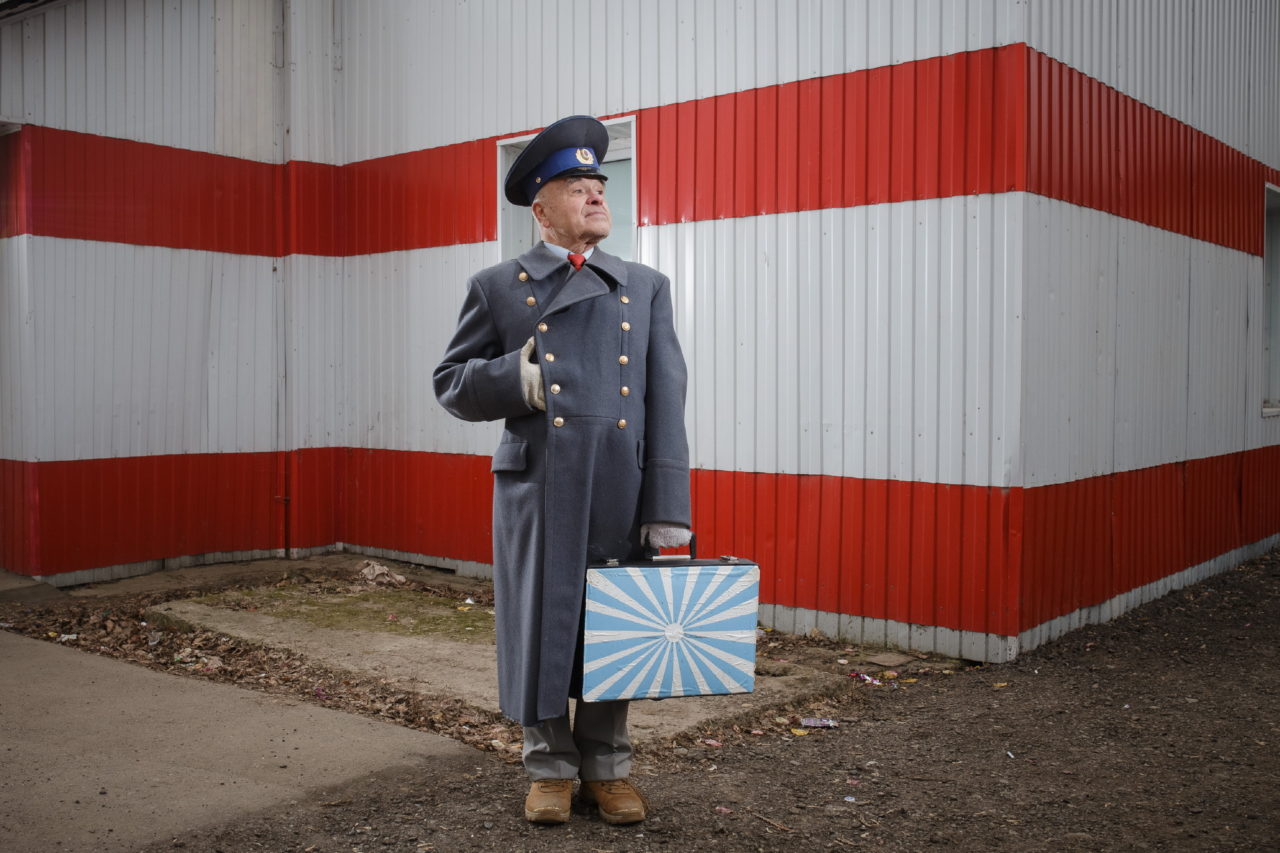
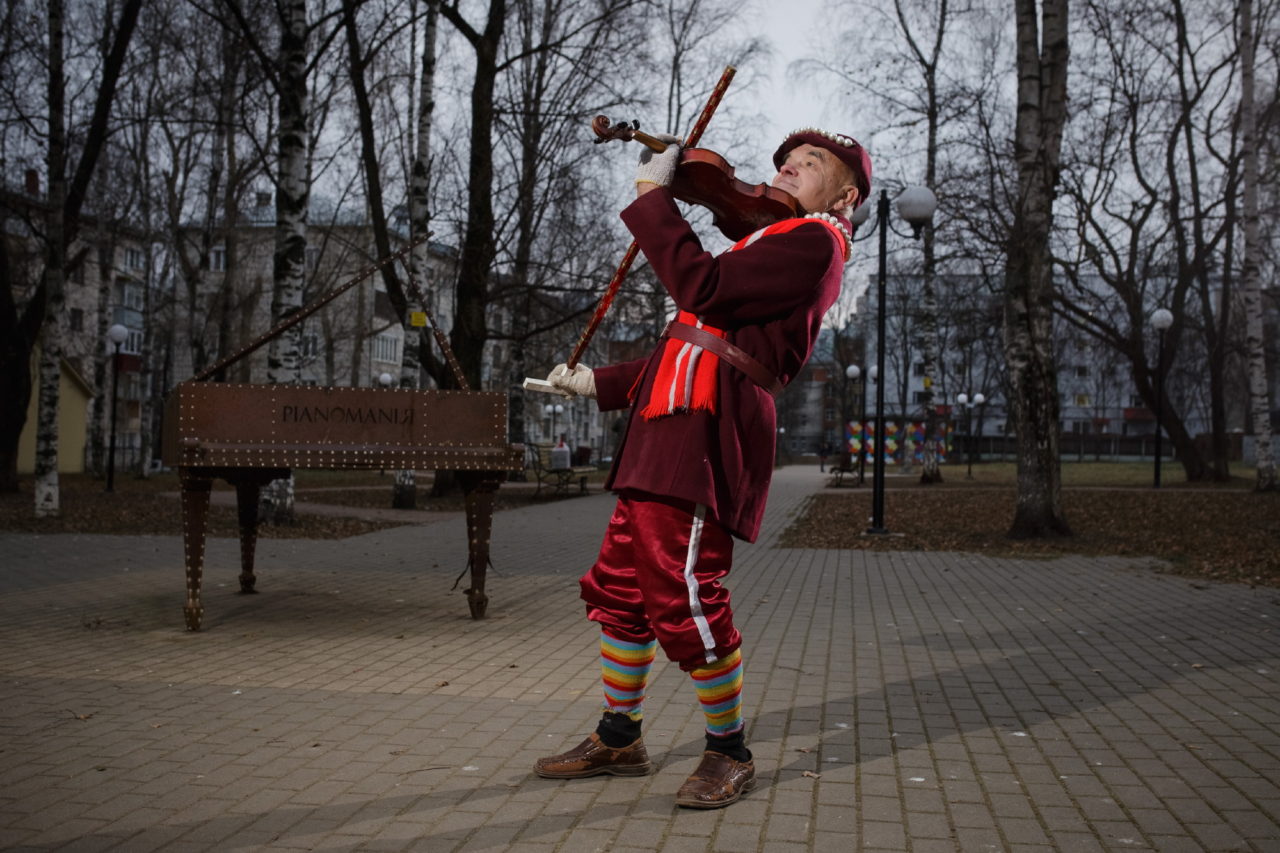
On the dirty streets of Veresniki, he is the singular bright spot. At the bus stop he is greeted by people in grey and black jackets, asking about his health. “Out for a stroll again? Well, go for it!” Then they notice me: “Take the young girl to the square and show her our river walk!”
Victor refuses to take a seat on the bus, so that everyone can get a good look at him. The not-so-young conductress flits up in her grey coat, “Oy, can I photograph you? Otherwise when I tell my kid about you, she won’t believe me!”
Kazakovets straightens his sword and smiles for the camera.
We do a lap around the square. Victor offers a salute to smiling passersby, and he does not refuse those who request a photo.
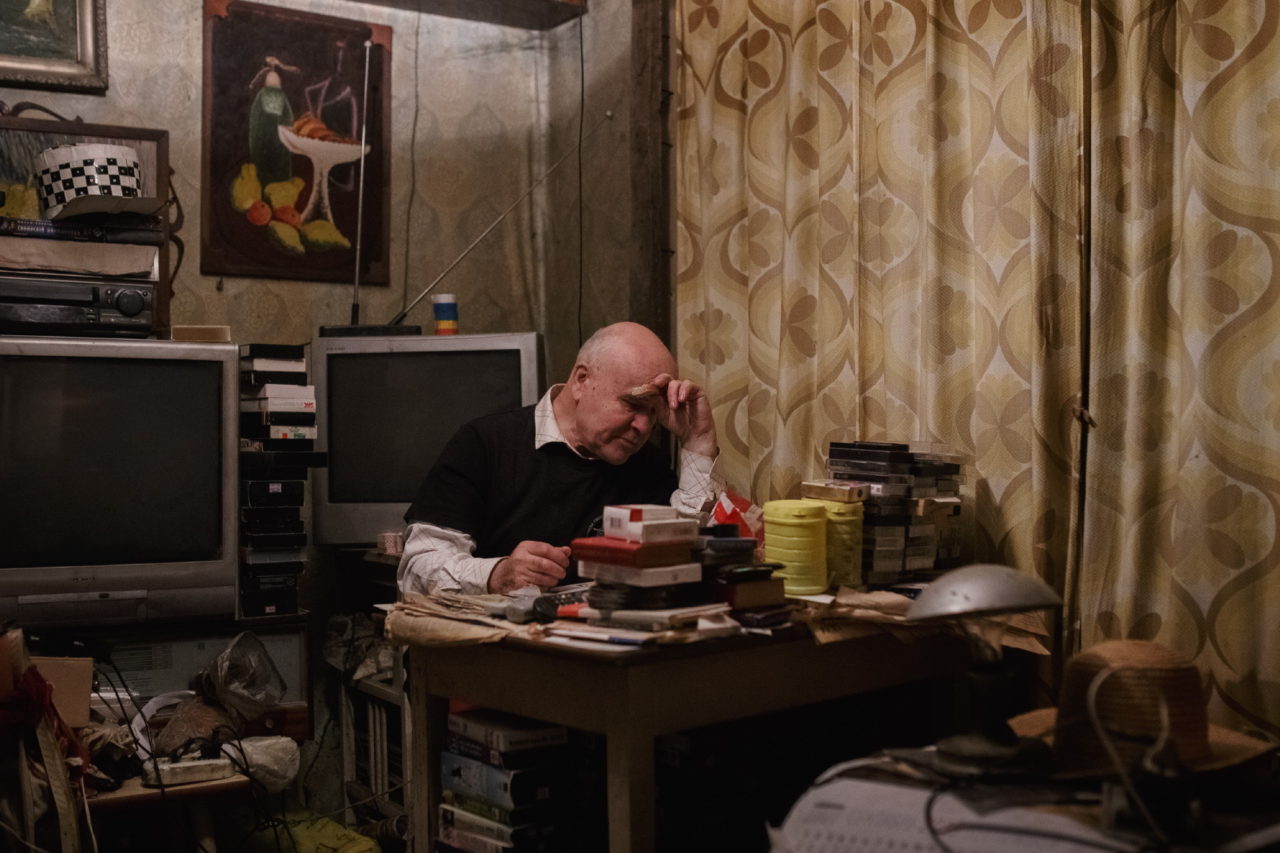
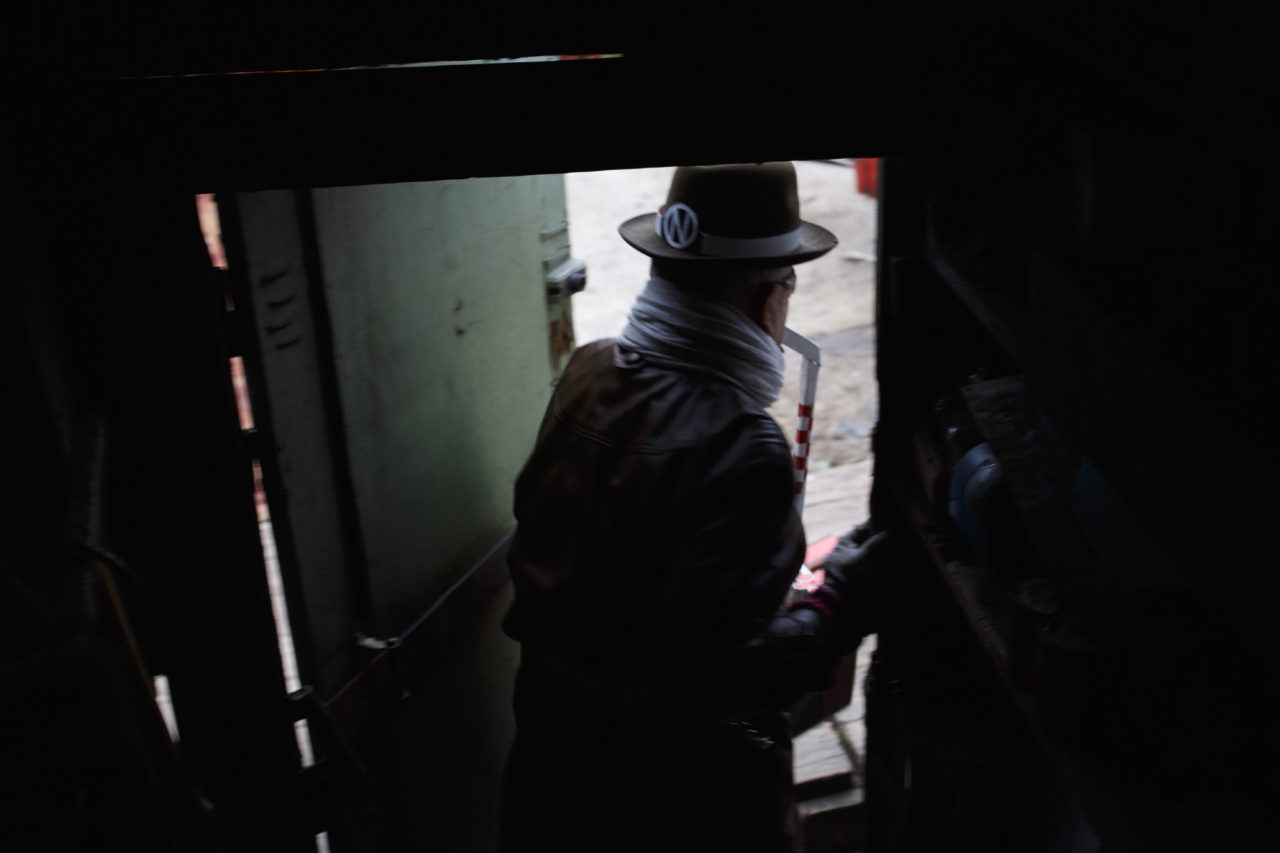
We are getting chilled, so I propose we step into a restaurant and get some dinner. Kazakovets gets nervous and shuffles his feet back and forth.
“I don’t go into such places, my income doesn’t allow it.”
I insist that it is my treat, and he agrees.
He chooses a chicken soup and coffee from the menu. “This is the tastiest soup I have ever had! I am very impressed. It is definitely better than the pelmeni that I ate this morning.”
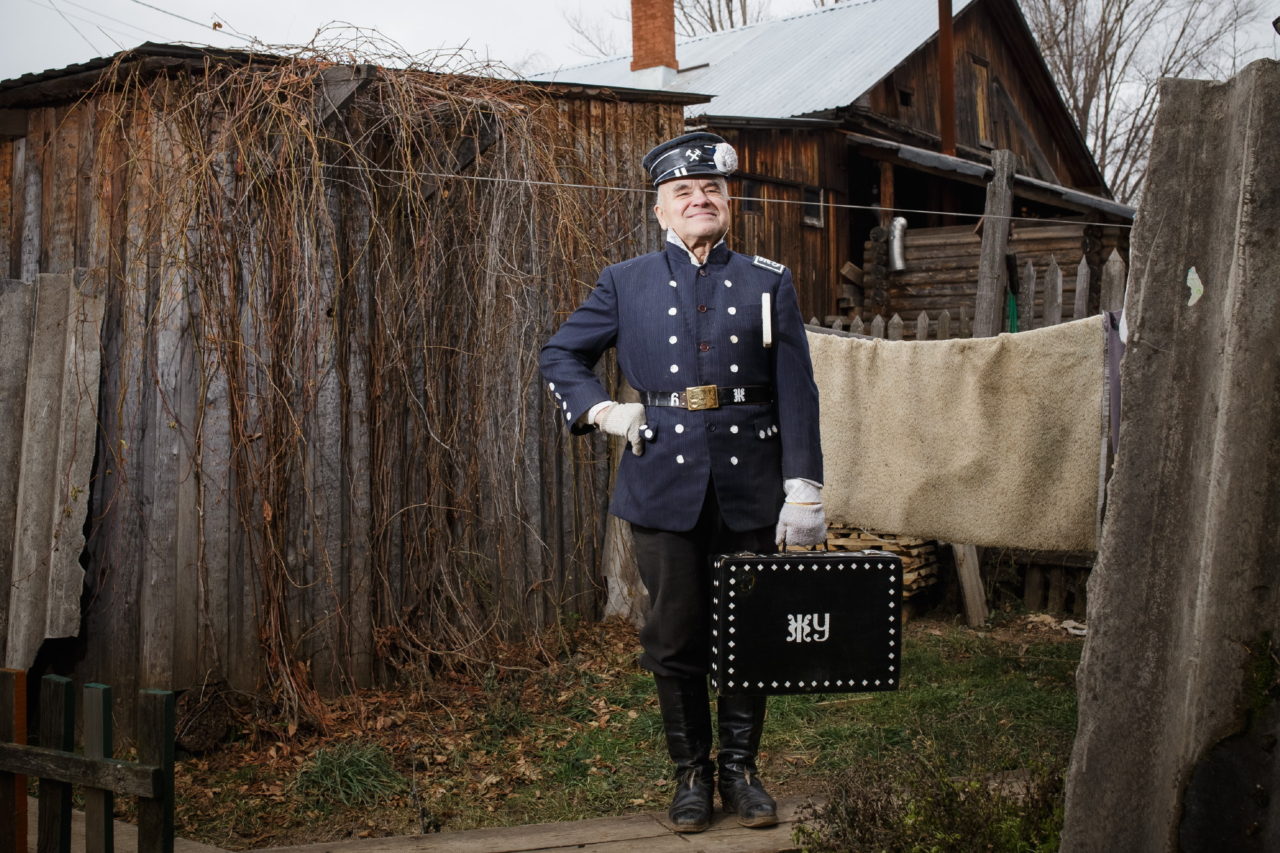
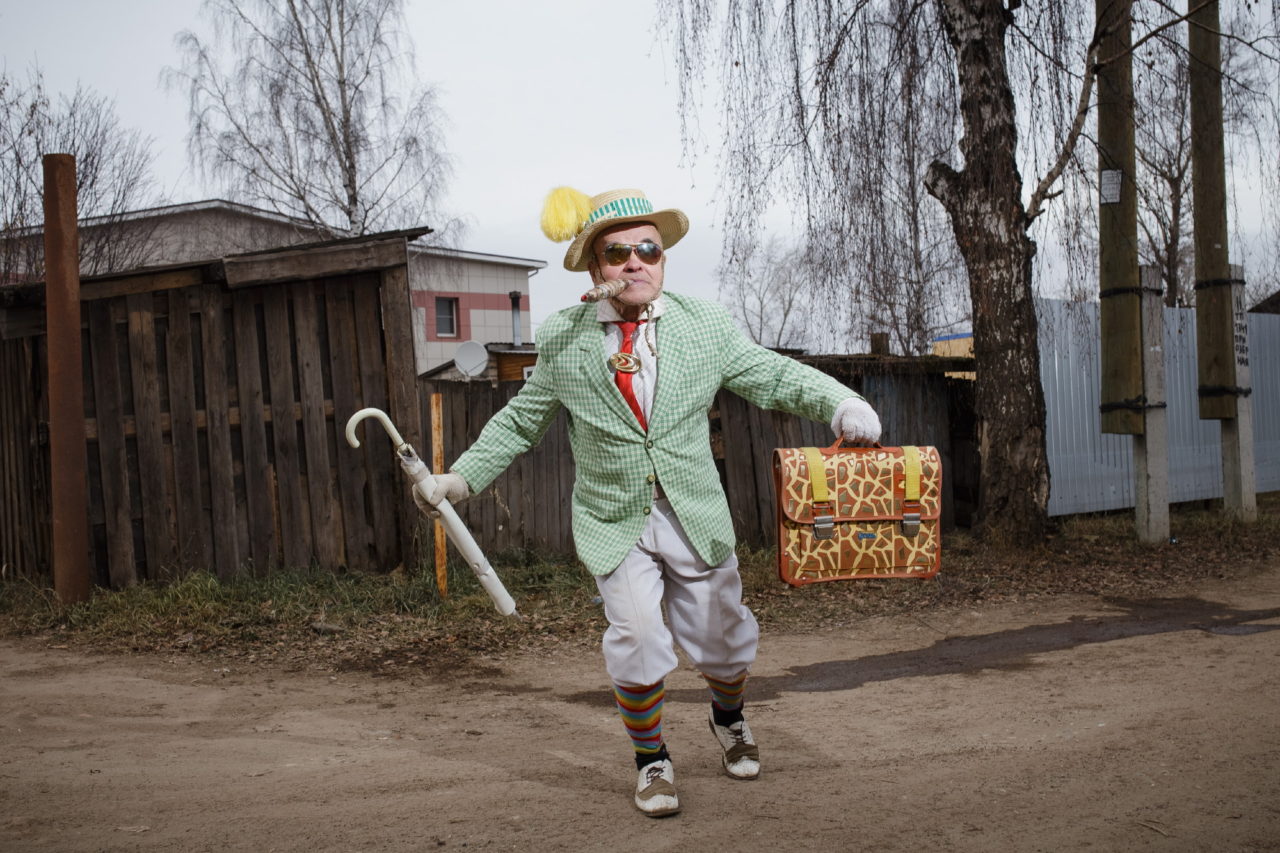
Victor’s monthly pension is 8,000 rubles ($125). One thousand rubles go toward rent and electricity, 1,000 for a bus pass, 3,000 for food (potatoes, pelmeni, vegetables). The remainder gets spent on household items and on clothes and calendars. “I don’t drink, don’t smoke, I have all I need. I’m not dying, as you can see.”
He purchases the raw materials for his outfits in second hand or consignment stores. Sometimes he succeeds in digging up a trench coat for 70 rubles, or pants for 50. “And the young girls – he glances at my jeans – spend loads of money on tattered pants.”
Victor bought a black overcoat for kopeks and embroidered it with white ribbons, in a checkered pattern. Then he made a checkered bag and bowler hat to match. The outfit caused a furor on the streets.
“The local press took notice and came out and wrote about me, took my picture. I even went to Moscow to be on the show with [Larissa] Guzeyeva. They simply called and suggested I come to Moscow, to show my outfits. Well, I took a few and went. And when we got there they said I should go on [Guzeyeva’s] TV program Let’s Get Married. But what kind of prospect would I be at 70? But it was too late, nothing to be done, I was already at the stage. ‘What do I do?’ I ask. ‘Just go on stage and act like a prospective husband.’ So I went out and did something. And later I got a few calls. What’s it to me? Well, it’s nice that people from Moscow call me, an old man.”
Alive
Victor paces back and forth along what little free space there is in his small, dark room. Sits on a chair. Fondles his accordion. Jumps up, and again walks back and forth. He’s worrying about something. We are waiting for the tea to heat up in a charred saucepan on the stove. And for the wood stove to warm up – the house is very cold. For dinner tonight there is sausages, wine, and cheese. It’s all for me; he would not allow himself such a feast. When the tea is ready, Victor washes the dirty glass until it shines and drops it into a tea glass holder. As I drink, he plays the accordion. And then he leads me through his closets, to show me his clothes.
If I were not here, he would be watching TV. Or studying English. In order to not be idle. All of the sewing and strolling about the streets is not because, as some believe, Victor is crazy. No, he is simply someone who is certain that people must work until the very end. Because “as long as you are working, you are alive.”
They booted Kazakovets from the stage, wrote him off, as he puts it, like scrap, and so he made the whole city his stage. Now he has a far larger audience than he ever had at the Palace of Culture.
“When a person is well turned out, the community finds it pleasant to look at him,” Victor explains. “So I am not simply walking about the city. I am making people happy, giving them an impression. When I sew or decorate my clothing, I don’t feel that I am a ne’er-do-well, that I was fired. And so I will continue to work.”
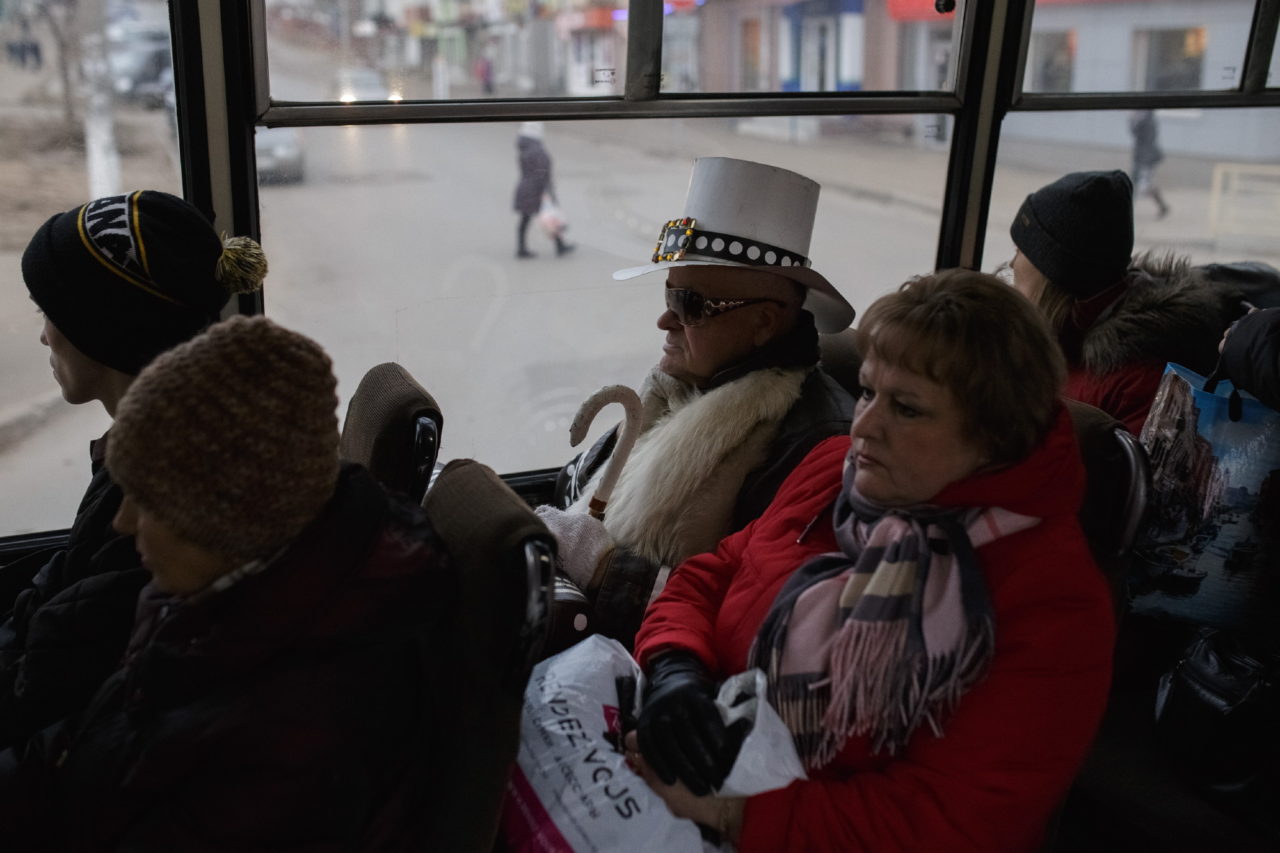
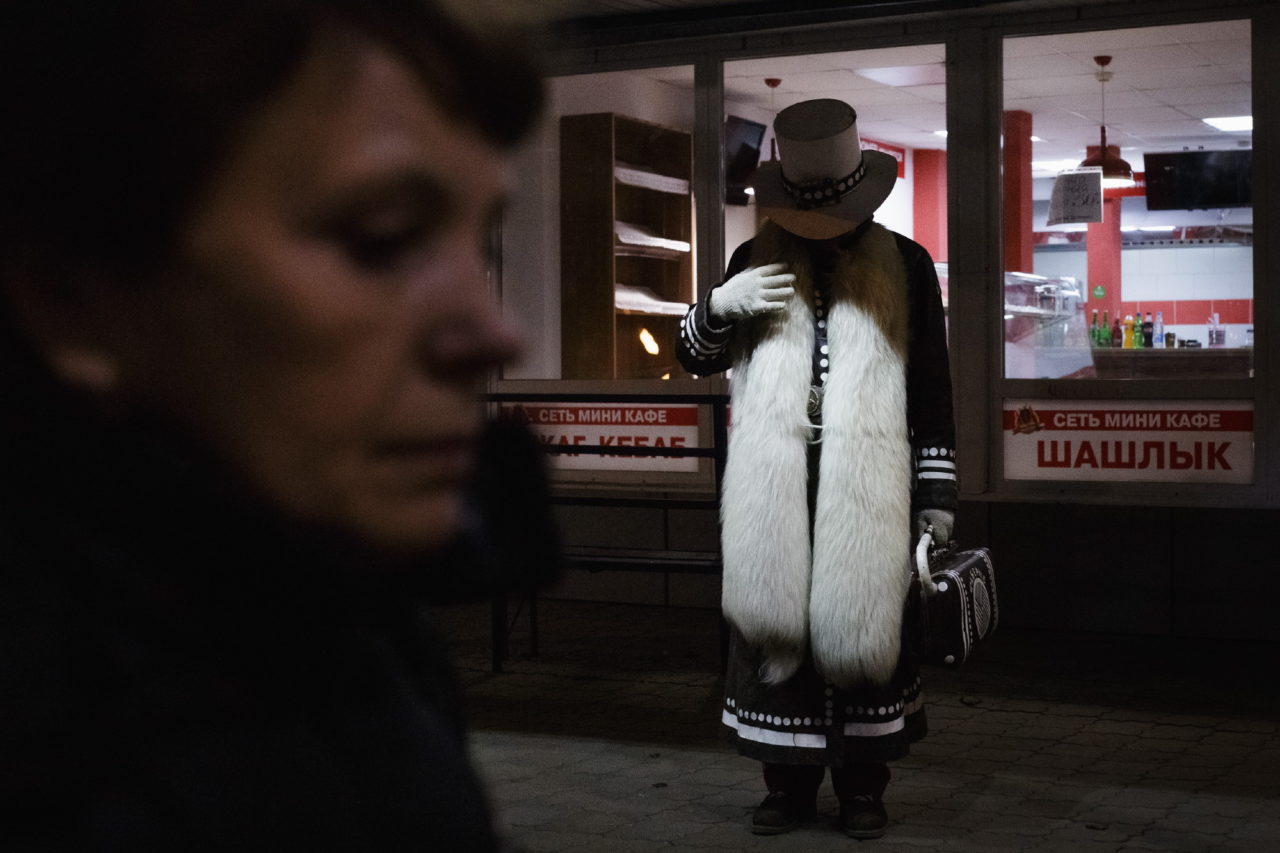
For Victor, the whole point is in the illusion of work. Thus, in his words, he “fortifies life,” he is “not falling into the trap of death.”
“How many of my friends died two or three years after retiring! Because they started doing nothing. And there are some who simply sit like statues for hours and days on end. I cannot understand that sort of person at all, and, without a doubt, I am not the same breed as them. I live!”
“Victor, are you free or isolated?” I ask, when the accordion falls quiet.
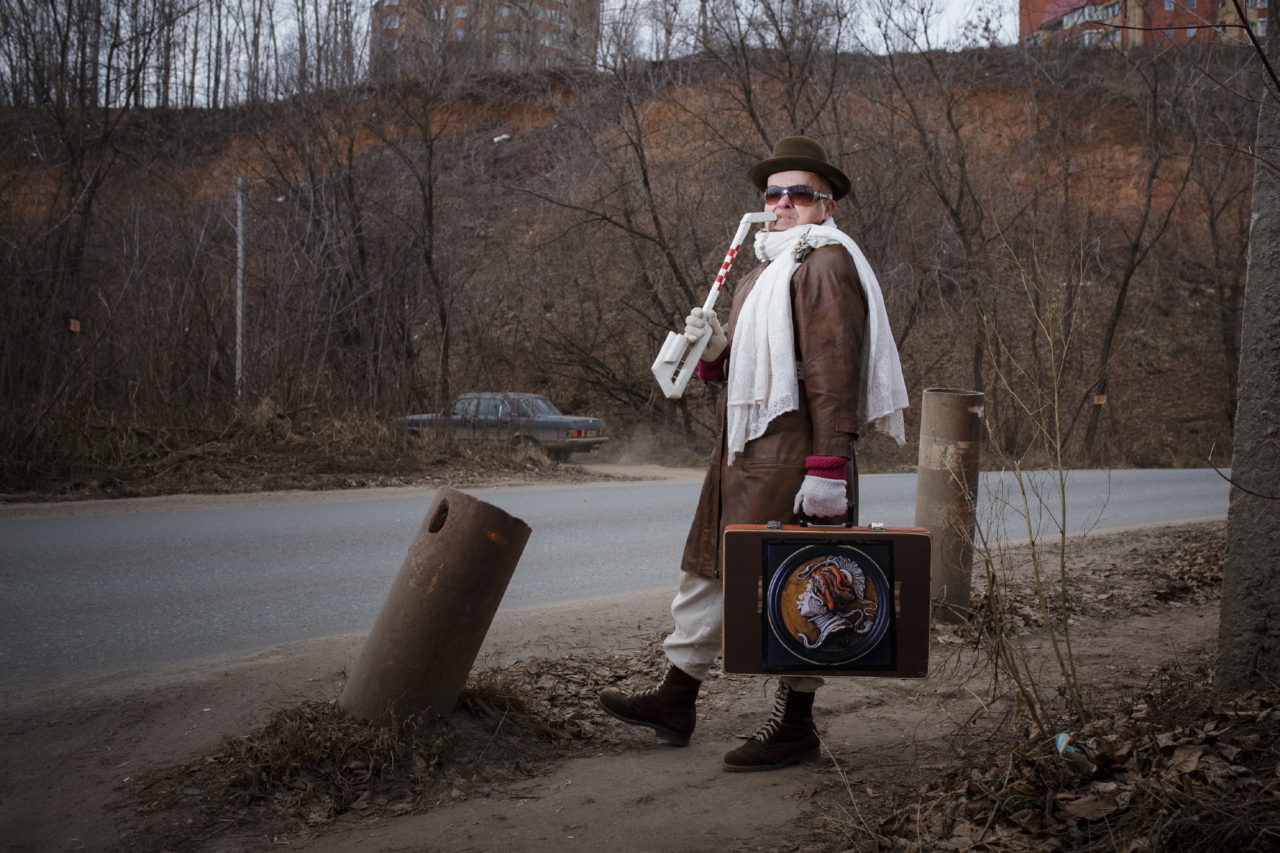
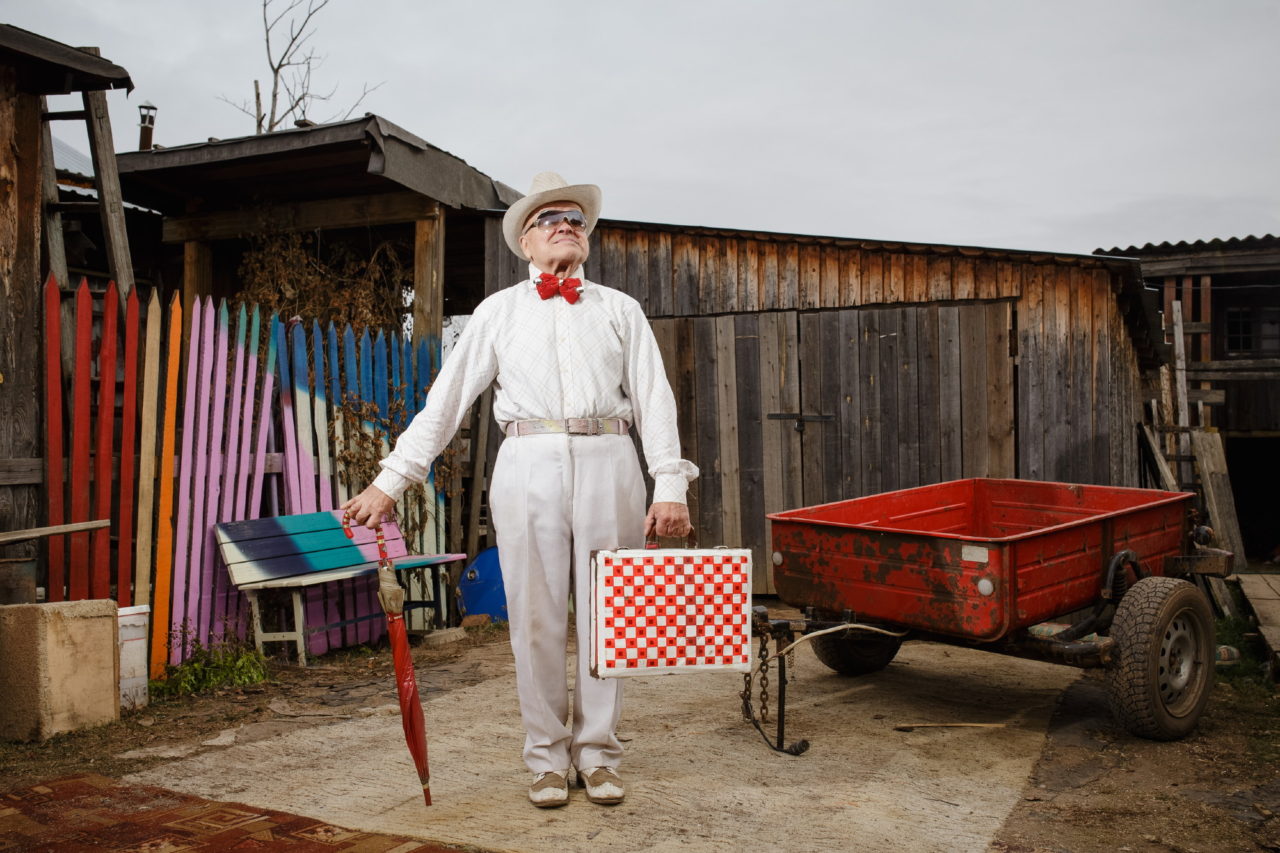
“Isolation and freedom, they are states of the soul, right?” he replies. “I have never felt like an isolated person! What kind of isolation can there be when there is so much work, when people notice me? Yes, I am a bit of a hermit, but I love to walk about the city. If I open my eyes in the morning, that means I am alive. And it means that I need to go out among the living and make my mark. Yes, I am a retiree near the finish line. And I dream of just one thing: to not become a burden on society before my death comes. I would like to die quickly, and not lie in a bed for years. Whoever wants to can then come and collect my outfits. I definitely cannot take them into the grave.”
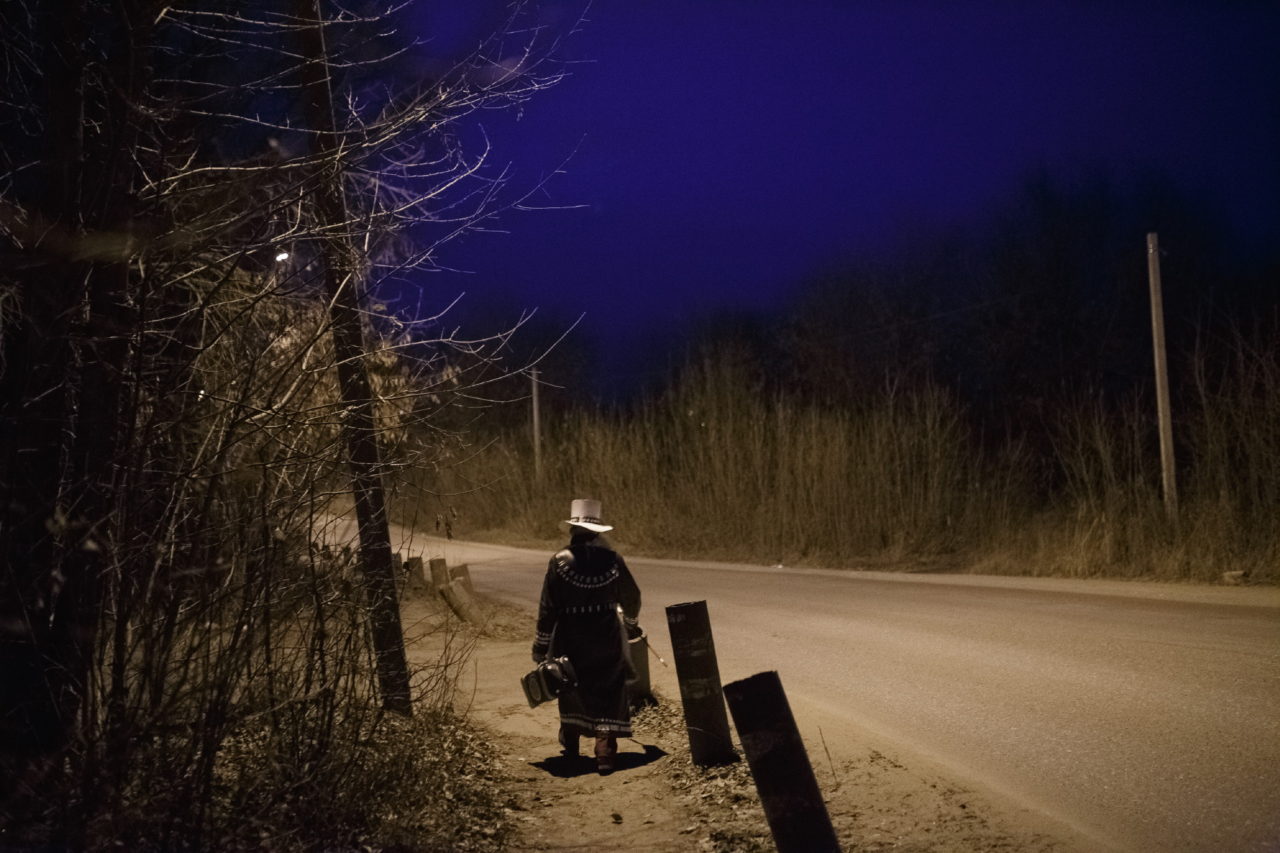
Victor stands at the gate as I get into the taxi. Before I left, he said that I had turned his normal day into a holiday, because I upset his typical retiree routine. Now he will go back inside and turn on the television, so that it does not seem like he is alone in the house. He’ll toss a log into the stove, push some of his things off his crumpled bed and fall asleep. But, come morning, he will pick out some sort of azure caftan, put on a pair of high boots and a smile, and head out to turn others’ normal day into a holiday.
Every day we write about the most pressing social problems in our country. Based on our experience, we are certain it is feasible to address and deal with them only by reporting the real state of affairs. This is why our team travels across the regions, takes interviews, talks to people and experts, does photo reportages to sportlight and document people’s lives and stories. We collect money for charity organisations without any commission on our part.
Our media exists due to donations. We hope you can consider subscribing for a monthly donation to support our project. Any help is valuable, especially if it is set on a regular basis. Any sum from you is an opportunity for us to plan our work.
Please, sign up to donate and sustain our media and cause.
Donate